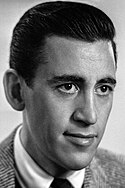J.D. Salinger Quote
I’m not too sure what the name of the song was that he was playing when I came in, but whatever it was, he was really stinking it up. He was putting all these dumb, show-offy ripples in the high notes, and a lot of other very tricky stuff that gives me a pain in the ass. You should’ve heard the crowd, though, when he was finished. You would’ve puked. They went mad. They were exactly the same morons that laugh like hyenas in the movies at stuff that isn’t funny. I swear to God, if I were a piano player or an actor or something and all those dopes though I was terrific, I’d hate it. I wouldn’t even want them to clap for me. People always clap for the wrong things. If I were a piano player, I’d play it in the goddam closet. Anyway, when he was finished, and everybody was clapping their heads off, old Ernie turned around on his stool and gave this very phony, humble bow. Like as if he was a helluva humble guy, besides being a terrific piano player. It was very phony—I mean him being such a big snob and all. In a funny way, though, I felt sort of sorry for him when he was finished. I don’t even think he knows any more when he’s playing right or not. It isn’t all his fault. I partly blame all those dopes that clap their heads off—they’d foul up anybody, if you gave them a chance.
I’m not too sure what the name of the song was that he was playing when I came in, but whatever it was, he was really stinking it up. He was putting all these dumb, show-offy ripples in the high notes, and a lot of other very tricky stuff that gives me a pain in the ass. You should’ve heard the crowd, though, when he was finished. You would’ve puked. They went mad. They were exactly the same morons that laugh like hyenas in the movies at stuff that isn’t funny. I swear to God, if I were a piano player or an actor or something and all those dopes though I was terrific, I’d hate it. I wouldn’t even want them to clap for me. People always clap for the wrong things. If I were a piano player, I’d play it in the goddam closet. Anyway, when he was finished, and everybody was clapping their heads off, old Ernie turned around on his stool and gave this very phony, humble bow. Like as if he was a helluva humble guy, besides being a terrific piano player. It was very phony—I mean him being such a big snob and all. In a funny way, though, I felt sort of sorry for him when he was finished. I don’t even think he knows any more when he’s playing right or not. It isn’t all his fault. I partly blame all those dopes that clap their heads off—they’d foul up anybody, if you gave them a chance.
Related Quotes
You can't fight hatred with hatred and expect anyone to listen to you. You can only try to lessen it with humor, wit, truth and commonsense. If that doesn't work run like hell, while they throw rocks...
About J.D. Salinger
The Catcher in the Rye (1951) was an immediate popular success; Salinger's depiction of adolescent alienation and loss of innocence was influential, especially among adolescent readers. The novel was widely read and controversial, and its success led to public attention and scrutiny. Salinger became reclusive, publishing less frequently. He followed Catcher with a short story collection, Nine Stories (1953); Franny and Zooey (1961), a volume containing a novella and a short story; and a volume containing two novellas, Raise High the Roof Beam, Carpenters and Seymour: An Introduction (1963). Salinger's last published work, the novella Hapworth 16, 1924, appeared in The New Yorker on June 19, 1965.
Afterward, Salinger struggled with unwanted attention, including a legal battle in the 1980s with biographer Ian Hamilton and the release in the late 1990s of memoirs written by two people close to him: Joyce Maynard, an ex-lover; and his daughter, Margaret Salinger.
